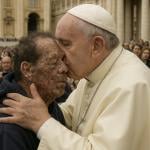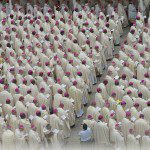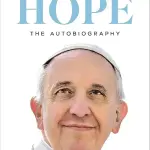Cardinals “Chito” Tagle and (further down) Timothy Dolan. Photosource: Catholic News Service
I don’t understand Italian! Che cosa ho detto?
Last week I did a quick interview with Mattia Ferraresi for Il Foglio, and today you can you can find it, in Italian, here.
My Italian is very poor — I need to brush off my Rosetta Stone discs and give them a whirl before I leave for Rome later this week — so I tried a machine translate of the thing, which was pretty ghastly!
So, here, absent Mattia’s actual report, are his questions, and my answers, in English:
MF: Conservative philosopher Roger Scruton told us that “Christianity has been intimidated by the secular world” and therefore the abdication of the Pope can be interpreted as a victory of the secular paradigm against the Church, a major concession to modernity. You say the resignation goes deeper than a concession to modernity. What is the most significant message the abdication sends?
ES: I agree with Scruton that in some ways Catholic Christianity has been “intimidated” by the secular, but this has been — in my opinion — true for decades, at least at the parish and university levels. Rome may have “held the line” against the fast advances of secular mores resulting from the one-two punch of the sexual revolution and unprecedented western prosperity, but the messages that we have received in the pews these past forty years have been pretty weak sauce, flavored with a nod to ecumenism (we mustn’t offend our non-Catholic brethren by throwing all that cant about birth control, sex outside of marriage or divorce out into the arena) and the sometimes misapplied seasonings of the Second Vatican Council, which documents often seemed distilled to an amorphous message: “mass is special; God is special, we’re all special; isn’t that special”?
A church charged to preach both love and justice, balanced by the mercy of Christ, has been afraid to plumb those depths and has instead skated upon the superficial ice of “being nice.” But a gentle message must be rooted to a depth of truth, or it is meaningless, and for many “meaningless” is precisely what the church has become. People say we are not “relevant” to their lives but an authentic life has little to do with “niceness.” An authentic life soars to heights and descends to depths, like the prayers of the psalms. It is no accident that the Pope is turning to monasticism. He is going to tap into those arcs in an unimpeded way
Regardless of encyclicals, pronouncements and pilgrimages, the lived reality of Catholicism in the West has made few demands on us and played right into the trending secular message that feeling good about the self and serving that feeling are our most important concerns. Many years ago, Pope John Paul II said that society had lost her sense of sin, and this was very true, and much of that loss was precipitated by theologians and teachers and even priests declaring that, as most of our faults could be explained away psychologically, there almost was no such thing as sin; a preoccupation with the notion was likely a sign of over-scrupulosity and neurosis. That can be so, of course, but the truth is somewhere in between “everything is a sin” and “nothing is”, and our sense of balance in recognizing this has been skewed for some time.
If the church wanted obedience at the institutional level, on a personal/pastoral level her priests have craved acceptance, and engagement that would not always keep them on the defensive. I don’t want to say they have been cowardly; I think the abrupt shifts and cherry-picked implementations of the council left our priests feeling both overwhelmed and poorly formed in the new sort of social dynamic with which they were faced: suddenly the congregation was as well-educated or better-educated than priests; laity were “liberated” and encouraged to question authority and I don’t think the priestly formation they had received up to then gave them any sense at all of how to communicate the Gospel and the catechism in new ways people could (or would) receive.
The failures of the church have been “top-down” in some ways, but also from the bottom, up. Rome has been perhaps too distant and insular; the bishops and priests on the other hand have been too remiss in their duties — these waves meet and we have a perfect storm to toss the Barque of Peter.
Having said all of that, I do not really think Benedict’s resignation is a concession to secularism at all; I believe it is, in fact, his headlong dive into pure battle, absent any trimmings of diplomacy. I think everything Benedict has done up to now has been an attempt to engage the modern paradigms with as much integrity as he could while remaining true to Christ and the church; he met with the right people, he made his arguments in a voice that even his critics admitted was more pastoral than they ever anticipated; he put reforms in place; he swept out the filth where he could, all to the near-constant derision (both in the world and in parts of the church) of those for whom no dirge he played could bring tears, no jig could make them dance.
Far from throwing in the towel, Benedict is recognizing that a church that constrains itself to the use of secularly-approved measures will always be a church under siege to that force.
 What role the tension between the Church and the secularized world is playing in this peculiar moment in the history of Christianity? Do you read it as a calling to rethink the relation between the Church and the world?
What role the tension between the Church and the secularized world is playing in this peculiar moment in the history of Christianity? Do you read it as a calling to rethink the relation between the Church and the world?
I don’t know that there is a genuine “relationship” between the world and the church. The world has played its role by dictating the rules of engagement, particularly for the last 50 years, and yes I think Benedict is demonstrating an overhaul of that paradigm, a re-thinking of the engagement with the world.
The church has — despite the complaining narratives — respectfully played by the world’s rules in some hope that if she simply tells the world as nicely as possible that yes, we are all special but also called to challenges and disciplines, the world will suddenly understand and agree. That has not happened and will not happen — Jesus said it could not — and Benedict, I think, completely sees this. At this point the world believes it is victorious and nearly ready to plant its flag and begin its pillage of the churches and the faithful, but no — Benedict is laying aside the secular weapons of engagement and picking up the atomic weapon that is prayer. Creation was formed on Intention and the Word, and to the Word, Benedict is going, with a great intention. It’s a subversive, sly and supernatural move. Sadly, because God’s time is not ours, and denouements are rarely neat, we may not see for decades or more, the power that is in this move of Benedict’s nor its conclusive results.
I don’t know if anyone would be interested in my fleshing out those thoughts more fully. Perhaps while I’m over the Atlantic, I’ll give it a shot!

















